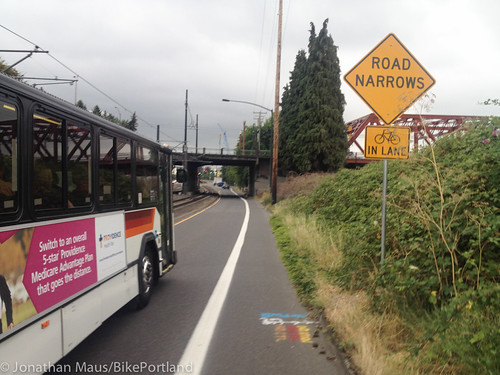
(Photo by J. Maus/BikePortland)
The Portland Bureau of Transportation (PBOT) has installed new signs on N Interstate Avenue in order to raise awareness of the dangers posed by a narrow bike lane.
As we shared last month, the new signs are the result of concerns from the community about the extremely narrow bike lane on a section of Interstate between Tillamook and the Broadway Bridge. At two locations where an overpass goes over the road (Larrabee and the bridge), the bike lane narrows, while the standard lane remains a constant width. At Larrabee, the bike lane goes down to just 2 feet and 7 inches wide — well below the City’s own safety standards.
This configuration is a major bicycle access problem because Interstate is a key north-south corridor and people often drive too fast and too close to bicycle riders in this area.
Advertisement
The new signs have been installed just to the right of the guardrail about 150 feet before the overpasses. (Note: This is different location than we reported last month.) The signs are of the yellow diamond advisory variety and they say, “Road Narrows: Bikes in Lane.”
Blake Goud, a north Portland resident and citizen activist who has been pressuring PBOT to make this and other changes to bicycle access on Interstate, now says he would like to see some police enforcement to go along with the new sign. On Tuesday, he sent the following email to PBOT’s Traffic Safety and Livability hotline and to Transportation Commissioner Steve Novick’s office:
“I would like to request enforcement action from Portland Police’s Traffic Division specifically for SB Interstate between the Larrabee offramp and the Broadway Bridge for speed (posted limit is 30mph which many vehicles exceed) and compliance with the sign directing cars to respect bicycles that are traveling outside of the bike lane in this section. I have experienced and others have shared with me experience with cars honking, drivers yelling and other aggressive behavior by drivers to intimidate cyclists from riding outside of the bike lane.”
We’ll keep you posted if/when the requested enforcement takes place.
Do you ride past this location frequently? Have you noticed the new signs? Do you think they will help?



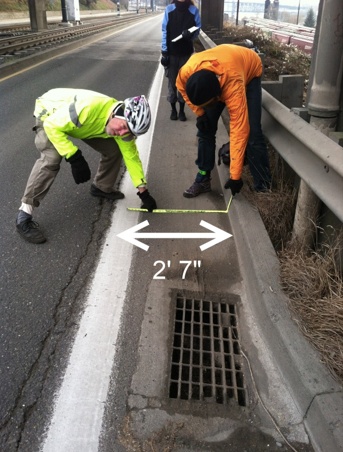
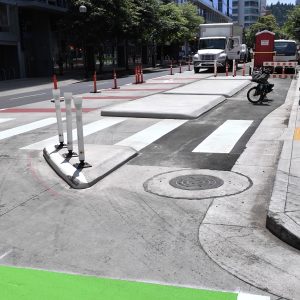
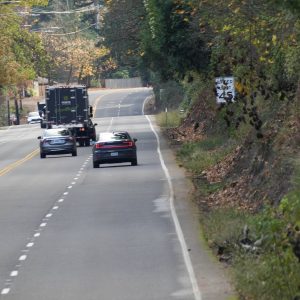
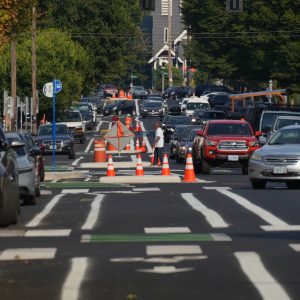
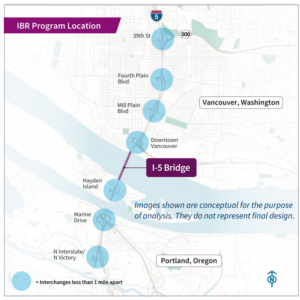
Thanks for reading.
BikePortland has served this community with independent community journalism since 2005. We rely on subscriptions from readers like you to survive. Your financial support is vital in keeping this valuable resource alive and well.
Please subscribe today to strengthen and expand our work.
Ride through here often on way home from work. Did not notice the signs on my bike. How can a motorist be expected to notice?
It would help if the recent light rail trains were never installed there. Bad traffic, no sidewalk in above photos, and a dangerous bike lane.
Signs are easily ignored. Better to design the street to encourage safe driving. Why not put some rumble strips in the car lane?
That would be totally inappropriate as rumble strips would become a safety hazard to cyclists who might need to change lanes there; for example, the bike lane can get covered in hazardous leaves and debris at certain times of the year and ice at others, and it’s effective width is already only something like one foot where drainage grates are present.
Suggestions from the MUTCD that apply here but usually are used for auto traffic:
(1) In the approach to this narrow hazard as bikes leave the bike lane the solid stripe should be dashed in the same manner as it is dashed for a right turn only automobile lane as it crosses a bike lane.
(2) There actually is a visually representative sign for “ROAD NARROWS” but it is only the line drawing and it shows both sides of a 2 lane road. It will almost be appropriate to use “LANE REDUCTION, RIGHT LANE ENDS”; obviously the word “bike” would replace “right” but the drawing on this 2nd sign makes the exact hazard much more plainly obvious.
(3) A “BIKES MAY USE FULL LANE” sign with a “DO NOT PASS” sign directly underneath it.
I can’t find any specific signage in the MUTCD that would go on the bridge visible to approaching drivers (and cyclists) but it almost seems like it would be a good idea to have “LANE NARROWS HERE” sign directly over the auto lane with a “BICYCLES MUST USE LANE HERE” straddling the painted fog line delineating the unsafely narrow bike lane.
Simple. Bulldoze the light rail line.
Yes. Oh course.
Kick out “the other guy”.
This is <eye rolling sarcasm> always </eye rolling sarcasm> the perfect solution to every problem.
From the perspective of auto drivers WE’RE the other guy who has no business on THEIR road.
From people who have contacted me, there doesn’t seem to be any impact from the signs, and even among people who have seen the signs, the issue is the ambiguity of {bike} in lane.
Is that saying
= Bikes stay in the bike lane?
= Bikes should use the main vehicle traffic lane
= Cars should be alert to bikes in the traffic lane
The biggest point is that the main danger area is not pictured in this post but well documented by Jonathan in an earlier post (http://bikeportland.org/2014/01/10/citizen-activists-work-to-fix-narrow-bike-lanes-on-interstate-ave-99687). These signs indicate an acceptance that the bike lanes under the bridges (NB & SB) are unsafe, and I hope that PBOT will decide to study bigger changes to this section.
Some of the suggestions from q`Tzal are good in reducing the ambiguity and almost forcing the two lanes (vehicle + bike) to share the limited space. One idea that may reinforce this is a clearer sign, rumble strips (though not in the section where bikes will be ridden) and a sharrow. But to be effective the signs need to be seen and the speed of travel needs to be slower. The wind buffeting from being passed by a large truck at 35mph and 25mph is noticeable.
Should the light rail train lines be removed so that there is more spaces for bike lanes and sidewalks?
No, there were problems with the way it was designed and there is a lot more bike traffic now than there was when it was installed, but the idea of removing public transit capacity makes no sense. Particularly when traffic backs up, the light rail provides a quicker option (just as it should, and as a bus could not). There are plenty of realistic options for improving the flow of traffic.
Have the light rail lines run well in “sizzling” 2014 weather and February’s snow “storm” as well as the bus lines?
The signs did nothing for me as I was passed very closely by several speeding trucks cars on Sunday going southbound right at the pinch point.
Seems like any permanent change in signage, lane alignment or traffic flow in general should be preceeded and, most importantly, followed by video footage of all traffic behavior.
Sure, it might be nice to be legally able to drop an automated ticketing system in every place like this but in our current “Cars First, Cars Last” planning space it would be very useful to get some hard evidence that a change does or does not make a difference.
Position farther left so it becomes impossible for cars to pass. Honks can’t hurt you the way a too-close pass can.
Don’t forget if there are aggressive drivers honking at you, you can report it to PBOT to highlight that the signs are not working (either they are not seen, ambiguous or ignored).
email safe@portlandoregon.gov
phone 503-823-SAFE
Folks, if you want to see something better here within your lifetime, be sure to convey your dissatisfaction with the current setup to the Portland Transportation Safety Hotline.
email safe@portlandoregon.gov
phone 503-823-SAFE
Ted Buehler
From the January 10, 2014 article on this site Citizen activists work to fix narrow bike lanes on Interstate Ave:
“In an email to the AROW list after the “measuring party”, Buehler reported that, “We found the skinniest spot to be southbound under the Larrabee overpass, where the driving lane is 10′ 4″ and the bike lane is 2′ 7″.”
If we assume the law requiring drivers to give bicycles a 3′ margin still applies then at the Larrabee overpass a 10′ 4″ lane is narrowed to around 7′ 4″
Even at wider areas in this section the legally allowable lane spacing while a bicycle is in this dangerous bike lane is insufficient to allow safe or legal passage of any common automobile.
What this plainly suggests, no demands, is that the lanes legally MUST merge before the narrow pinch point. There is not room; legally, practically or safely; to allow 2 separate lanes to operate in this pinch point.
Road design safety standards that haven’t changed for decades back this conclusion: there is no room for a 2nd lane of any type.
But take heart: by reclassifying this as a merge it allows many other tools be brought to bear. Better signage, specific guidelines on allowable maximum speeds based on merge distances and sightlines.
Given the lack of a devil’s advocate on this “mandatory lane merge” of mine I must admit I have some concerns about its potential application.
If we follow the logic of road safety design standards (based on factors like speed, VPM, largest/heaviest allowed reference vehicle) then the bike lane may need to be merged in “X” feet (1) before the Larabee overpass completely through to “X” feet past the Broadway Bridge overpass. This is because “X” feet of distance is required for a merge. If “X” is bigger than ¼-½ of the distance between the two overpasses then splitting back out then re-merging is unsafe and counterindicated. It becomes as safe as weaving in and out of parked cars with your bike in a narrow rectangular concrete luge track.
In this situation we might also consider, at least as an interim solution, portable concrete barriers placed centered over the painted bike lane line. There are no reasons to cross in this area so no pedestrian nor bicycle crossing opportunities would be eliminated.
The problem I see is that this “safe merge distance for under-width lanes” line of reasoning could be used to invalidate potentially a lot of existing bike lanes. I leave it up to the reader to decide if this a “Good Thing®” or a “bad thing”.
.
.
(1) I don’t remember what “X” should be off the top of my head. I know I downloaded the design spec pdf at home and will look at it as soon as I get back.
“Just use Williams/Vancouver” eventually became the answer when I lived in Overlook, especially during rush hour.
I know it’s a personal issue, but this is what keeps down the rage. It’s the timid person riding their brakes all the way down. It’s the Cat 6er racing to pass me so they hit the red light. It’s the cars that block me from passing that Cat 6er when the light hits green and they’re making a dead start.
I know the feeling, but the further north and west you live from Interstate & Going the more impractical Williams/Vancouver become, not to mention the congestion on those streets and being forced to ride in a door zone with all the condos and restaurants.
For Overlook, if you look at Census data, it doesn’t seem to make a difference in ridership that the route down Interstate/Greeley is so awful (it is lower, but not by too much relative to the Boise / Eliot neighborhoods).
However, Arbor Lodge, Kenton and points further west (Portsmouth, St. Johns, etc) have dramatically lower rates of biking to work which I think is likely due to the poor infrastructure (North Portland, including Overlook) accounts for >10% of Portland’s population so it is not acceptable for patch jobs to fundamentally unsafe routes that lead many (not just you) to abandon the most direct route for congested alternatives.
I don’t know why anyone would say that the bike lane pictured is 2′-7″.
Looks more like less than 1′ to me. I don’t think bike lane width should be judged from stripe to curb, it should be determined by the amount of actual riding space available without the rider having to skirt obvious hazards like a drainage grate.
It’s been too long since I had driver’s ed but my recollection is that no part of a vehicle is supposed to hang over any part of the line. So, if you dropped a plumb line from your elbow or mirror or whatever sticks farthest out on the left side of your bike, it shouldn’t touch any part of the painted line. Then, if you exclude riding on the grate (and I agree that’s reasonable), the bike lane width becomes a negative dimension. Ouch!
If anyone has a large set of ground level photos of this entire area public please post a link.
I won’t have time to do it myself when/if I get home this weekend.
My preference, when I do it myself, is to take nearly 360 flat level shots every 5′-25′ depending on quality of sightlines. This makes stitching together a continuous visual narrative easy and tons of different photo angles makes photoshopping easy-peasy.
Markings painted on the road, or signs on the bridge, are more likely to get attention. An unlit sign stuck on a post by the side of the road – that is not really trying.
The light rail train line on Interstate Ave is a joke. Auto traffic is bad, the bicycle lane is narrow, and there are places with no sidewalks! The light rail train doesn’t run at 3:00 AM like a bus can do.
You don’t seem to understand the the difference between “can’t” and “doesn’t”.
Did the “extreme” weather of 2014 halt bus routes in and around the city like the light rail lines? Real emergencies will call on reliable bus routes.
I ride this section almost daily. I’ve also found the new sign completely ineffective. Vehicle speeds still way above the speed limit and no evidence that vehicle behavior has changed. A flashing sign mounted on the overpass might be more effective but I doubt that any sign will be effective here. The bike lane stripe should be removed from that section and sharrows added. Rumble strips and/or speed humps may also help.
I agree. I don’t see much value in having an undersized bike lane for this short stretch, but vehicle speeds need to be dealt with too which is why I asked for enforcement. And of course, we don’t have to worry about Oregon drivers merging
This fixes everything. As all of us who have taken the driving test in Oregon know that reading comprehension, situation awareness, and top levels of alertness are what make the test sooooooooooooooooooooooooo hard.
Nothing says “I acknowledge that we have created a life-threatening transportation facility but cannot be bothered to address it” like this lame sign.
Thanks for all of your efforts Blake, Ted, Jonathan, etc. keep up the great work. PBOT, shame on you.
all they did was install that sign?
what does it mean?
is it an alert to cyclists that their lane gets narrow and to pay more attention to stay in the lane with the hazard it creates?
is it an alert to cyclists that the motor-vehicle lane gets narrow and to brace for rear-impact from a mirror because you’re forced to stay in the bike lane?
is it an order to cyclists to violate ORS 814.420 and leave the bike lane simply because it narrows? and if so what is the minimum width at which we can legally violate ORS 814.420 in such a situation?
…
this sign does absolutely nothing but add to the clutter of things to ignore that aren’t hazards…
signs, signs, everywhere there’s signs…
f’in up the scenery, breakin’ my mind…
do this, don’t do that, can’t you read the sign?!
I’m a little bit late, but…THIS! There are too many laws that attempt to keep cyclists in “their place”, but they either conflict with each other (or themselves) or, as in this case, create a recognized unsafe situation to the extent additional, seemingly contradictory signage is required.
“Bikes in Lane”? Which lane? The bike lane? The other lane? Does this signage suggest that possible unsafe passing is considered one of the “hazards” that constitute an exception to 814.420? If so, then as you suggest, when else can we apply that principle? We already know that the “safe passing” law does not apply when there is a bike lane present; what if there is a bike lane present and a cyclist is not in it? Would judge Zusman find that the cyclist could legally be run over? But what if this sign was also present?
Pffffffftt!
Work to make the North Portland Greenway Trail, a multi purpose off road trail along the river, through lower Albina and over the Larabee Overpass a as a safer and more enjoyable ride between north Portland and points south.
The major changes to provide a long-term solution will best be accomplished through the North Portland Greenway Trail project, on which a lot of excellent work has been done and is continuing.
Another way to gracefully discourage car traffic on Clinton during this time would be to “critical mass” the cross streets the Clinton needs to stop for. Just get a posse of you and your friends, and ride back and forth on the cross street, ensuring that cars on Clinton need to wait a respectable period of time before proceeding. Bonus points for slow convoys with long trailers.
As long as you make a legal U turns, there’s nothing wrong with this, it’s a perfectly legal and legitimate use of the public street system. Just like other pleasure travel. Some people like to go on Sunday Drives in the country, some people like to ride loud motorcycles around at 2:00 am, some people never tire of the same lovely scenery riding a bicycle in inner SE.
Ted Buehler
Whoops, wrong thread.
Though the same principle could apply to forcing compliance of motorists to allow bikes the full use of the lane under the Larrabee Viaduct. Simply ride a bike with a trailer that is too wide for a car to physically pass, and take the lane under each bridge, then repeat…
Ted Buehler
I drive by there often. Always give cyclists as much room as possible, but other drivers don’t seem to be as considerate. I think most seem to think cyclists should stay in the lane and don’t understand the lane is too small. These signs are not helpful at all. Does the roadway in fact narrow or just the bike lane? Could PBOT wide the bike lane and add rumble strips there?
The rail line narrows the road
Had a close call with a UPS big rig today. Like… had I not slammed on my brakes I’m pretty sure I wouldn’t be writing this post. We had a mature conversation about it at the next light and my conclusion is that this is entirely on the city.
It’ll be a sad day when someone is killed here, but it seems like that and the subsequent seven figure payout to the family are what it takes for change?
I really hate a lot about my Greeley and Interstate commute, but I think the solution for these underpasses has been mentioned in the comments – I will be taking the lane from now on.